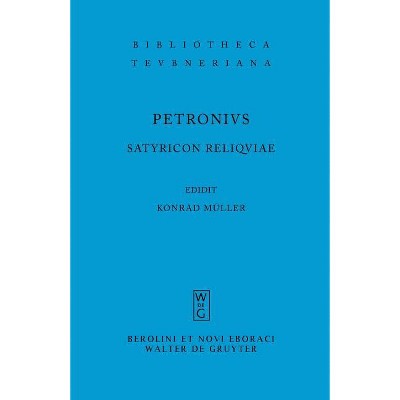Sponsored

The Satyricon - by Petronius & Seneca (Paperback)
In Stock
Sponsored
About this item
Highlights
- "This version by a translator who understands the high art of low humor is conspicuously funny.
- About the Author: Gaius Petronius Arbiter was a Roman courtier.
- 192 Pages
- Fiction + Literature Genres, Classics
Description
About the Book
"One of the finest achievements of the Roman imagination ... apparently a bewildering hodgepodge of genres and subjects ... clearly in the mainstream of ancient satire, it is also something recognizably apart and utterly original; visibly a novel, it is yet somehow not a novel at all ..."--P. v.Book Synopsis
"This version by a translator who understands the high art of low humor is conspicuously funny."--Time The Satyricon is a classic of comedy, a superbly funny picture of Nero's Rome as seen through the eyes of Petronius, its most amorous and elegant courtier.William Arrowsmith's translation--a lively, modern, unexpurgated text--recaptures all the ribald humor of Petronius's picaresque satire. It tells the hilarious story of the pleasure-seeking adventures of an educated rogue, Encolpius, his handsome serving boy, Giton, and Ascyltus, who lusts after Giton--three impure pilgrims who live by their wits and other men's purses. The Satyricon unfailingly turns every weakness of the flesh, every foible of the mind, to laughter.
Review Quotes
"This version by a translator who understands the high art of low humor is conspicuously funny."
--Time
"William Arrowsmith's translation of The Satyricon meets the two fundamental requirements of the translator's art: perfect fidelity to the original and a vitality of style that tempts the reader to believe that the English version is not a translation.... A classic of literature."
--Allen Tate
"Arrowsmith's brilliant translation ... at one stroke renders every other version obsolete."
--London Times Literary Supplement
About the Author
Gaius Petronius Arbiter was a Roman courtier. He was the author of the Satyricon, a satirical novel written during the Neronian era. Lucius Annaeus Seneca, statesman, philosopher, advocate and man of letters, was born at Cordoba in Spain around 4 BC. He rose to prominence in Rome, pursuing a career in the courts and political life, for which he had been trained, while also acquiring celebrity as an author of tragedies and essays. Falling foul of successive emperors (Caligula in AD 39 and Claudius in AD 41), he spent eight years in exile, allegedly for an affair with Caligula's sister. Recalled in AD 49, he was made praetor and was appointed tutor to the boy who was to become, in AD 54, the emperor Nero. On Nero's succession, Seneca acted for some eight years as an unofficial chief minister. The early part of this reign was remembered as a period of sound government, for which the main credit seems due to Seneca. His control over Nero declined as enemies turned the emperor against him with representations that his popularity made him a danger, or with accusations of immorality or excessive wealth. Retiring from public life he devoted his last three years to philosophy and writing, particularly the Letters to Lucilius. In AD 65 following the discovery of a plot against the emperor, in which he was thought to be implicated, he and many others were compelled by Nero to commit suicide. His fame as an essayist and dramatist lasted until two or three centuries ago, when he passed into literary oblivion, from which the twentieth century has seen a considerable recovery. William Arrowsmith was an American classicist, academic, and translator. His translations include works by Euripides, Aristophanes, and Petronius. He died in 1992.Shipping details
Return details
Trending Literary Fiction











